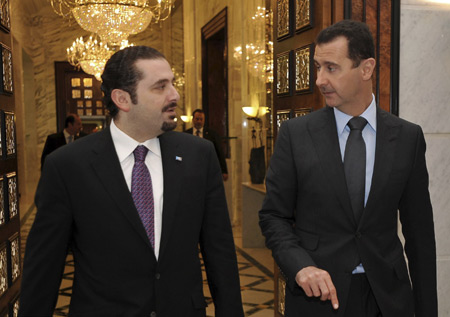Hariri's visit to Damascus ends years of bitterness between Lebanon, Syria
Lebanese Prime Minister Saad Hariri ended on Sunday a landmark visit to Damascus, pledging with Syrian President Bashar al-Assad to open new prospects on bilateral relations.
 |
|
Syria's President Bashar al-Assad (R) walks with Lebanese Prime Minister Saad al-Hariri after a meeting in Damascus December 20, 2009. Hariri said on Sunday he agreed with Assad on practical steps to open up "new horizons" in ties between the two Arab neighbours. [Xinhua/Reuters Photo] |
"Syria and Lebanon will not benefit from negative perceptions," said Hariri to reporters at the end of his trip to Syria, adding that "Lebanon should learn from past experience and look positively toward the future in an effort to open new horizons for both countries."
The 39-year-old prime minister's visit to Syria ends nearly five years of bitterness with Damascus. Relations between Hariri and Syria have been edgy since Feb. 14, 2005, when Hariri's father Rafik Hariri, the former Lebanese prime minister was assassinated in Beirut. Syria is suspected of being involved in the killing.
Hariri's meeting with Assad is seen as an opportunity to change the course of relations between the two neighboring countries. It is also seen as a significant sign of rapprochement between Syria and Saudi Arabia, both of them have been exerting major political influence in Lebanon.
The assassination: before and after
The investigation into Rafik's assassination, led by the UN Special Tribunal for Lebanon, indicated in its first two reports that the Syrian government might be linked to the assassination, which Damascus has consistently denied.
Rafik's killing led to the end of Syrian troops' 29-year presence in Lebanon, and brought the anti-Syria politicians into power.
The former prime minister was considered as both Saudi Arabia and Syria man in Lebanon since 1989, when the Taif Agreement was reached to end Lebanon's 16-year civil war.
Rafik Hariri conducted a policy of rapprochement and cooperation with the Syrian leadership until continued pressure from Damascus in 2004, led the Lebanese Parliament to extend former Lebanese President Emile Lahoud's six years term for an additional three years.
However, Rafik Hariri, who had tense relations with Lahoud, was frustrated by the extension.
In September, 2004, UN Security Council adopted the Resolution 1559. It called upon "foreign forces" (referring to Syria) to withdraw from Lebanon and to cease intervening in Lebanese internal politics.
The resolution, which also calls for the disarmament of armed militias such as Hezbollah, was sponsored by the U.S. and France, but it also came at a time when Rafik Hariri started shifting its policies towards opposing the Syrian influence in Lebanon.
"My father became a martyr for Lebanon's sake, it is not difficult for his son to act for Lebanon's sake," Saad Hariri told al-Hayat newspaper on Sunday.
"Hariri has no other way but to be on the good side of Damascus," said Hilal Khashan, a professor from the Political Studies and Public Administration Department at the American University of Beirut, "no Lebanese politician can antagonize Syria and expect to get away with it."
Peter Harling, a senior analyst from the Middle East Program of the International Crisis Group, also said that Hariri's visit to Syria "points to an important, basic fact, that Saad Hariri cannot be successful as a prime minister without turning a page on the past."
'Political war' between Syria and Saudi Arabia
The assassination of Rafik Hariri led to enormous tension between Syria and other Arab states, especially Saudi Arabia. A kind of "political war" has started since then between Damascus and Riyadh.
Lebanese political factions also found themselves divided into two major coalitions. The majority, backed by Saudi Arabia and the West, is led by Saad Hariri, while the opposition, backed by Iran and Syria, is dominated by the powerful Shiite armed group Hezbollah.
"War" between the two sides first took place over the UN Special Tribunal for Lebanon, which was established in March 2006 and mandated to try those suspected of assassinating Hariri.
The UN court was seen as a political motivated tool to press Syria, which was consistently attacked by Saad Hariri and his coalition. While Saudi Arabia supported the court, Syria showed signs of mistrust against it.
The 34-day war between Lebanon and Israel in July 2006, led to a bigger rift between Syria and Saudi Arabia. After Hezbollah abducted two Israeli soldiers on the border with Israel, Saudi Arabia accused the Syrian and Iranian backed group of "adventurism" and being "irresponsible."
Syria decided to respond in a harsh way. In a speech in August 2006, Assad said that Israel had suffered a defeat in that war. He called Arab leaders that have criticized Hezbollah "half-men."
 0 Comments
0 Comments






